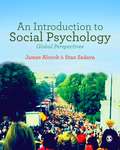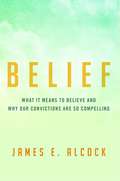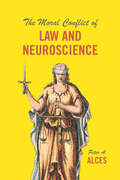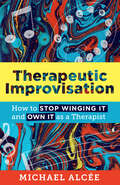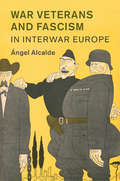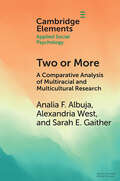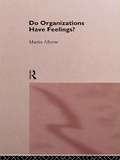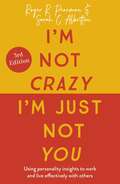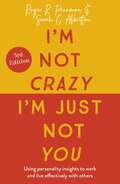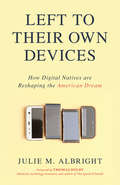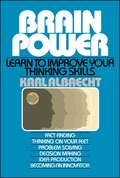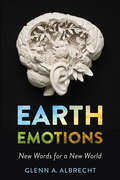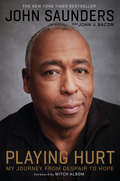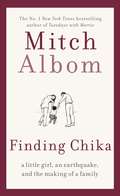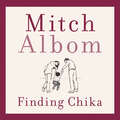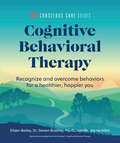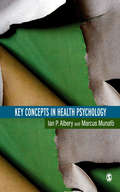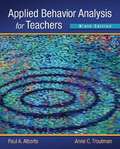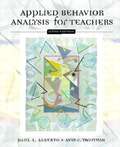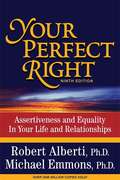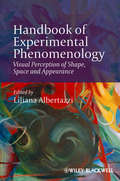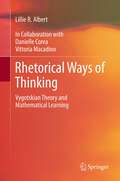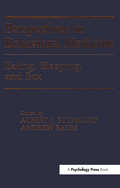- Table View
- List View
An Introduction to Social Psychology: Global Perspectives
by James Alcock Stan SadavaPsychology recognises no borders. The relationships between people and the groups they form are determined by similar principles no matter where in the world they come from. This book has been written to introduce students from all countries and backgrounds to the exciting field of social psychology. Recognising the limitations that come from studying the subject through the lens of any one culture, James Alcock and Stan Sadava have crafted a truly international social psychology book for the modern era. Based on classic and cutting-edge scholarship from across the world, An Introduction to Social Psychology encourages mastery of the basics as well as critical thinking. Incorporating relevant insights from social neuroscience, evolutionary theory and positive psychology, it offers: Chapters on crowd behaviour and applied social psychology Discussion of new means of social interaction, including social media Relevant insights from social neuroscience, evolutionary theory and positive psychology A companion website at study.sagepub.com/alcocksadava featuring extensive additional resources for students and instructors
Belief: What It Means to Believe and Why Our Convictions Are So Compelling
by James E. AlcockAn expert on the psychology of belief examines how our thoughts and feelings, actions and reactions, respond not to the world as it actually is but to the world as we believe it to be.This book explores the psychology of belief - how beliefs are formed, how they are influenced both by internal factors, such as perception, memory, reason, emotion, and prior beliefs, as well as external factors, such as experience, identification with a group, social pressure, and manipulation. It also reveals how vulnerable beliefs are to error, and how they can be held with great confidence even when factually false. The author, a social psychologist who specializes in the psychology of belief, elucidates how the brain and nervous system function to create the perceptions, memories, and emotions that shape belief. He explains how and why distorted perceptions, false memories, and inappropriate emotional reactions that sometimes lead us to embrace false beliefs are natural products of mental functioning. He also shows why it is so difficult to change our beliefs when they collide with contradictions.Covering a wide range -- from self-perception and the perceived validity of everyday experience to paranormal, religious, and even fatal beliefs--the book demonstrates how crucial beliefs are to molding our experience and why they have such a powerful hold on our behavior.
The Moral Conflict of Law and Neuroscience
by Peter A. AlcesLaw relies on a conception of human agency, the idea that humans are capable of making their own choices and are morally responsible for the consequences. But what if that is not the case? Over the past half century, the story of the law has been one of increased acuity concerning the human condition, especially the workings of the brain. The law already considers select cognitive realities in evaluating questions of agency and responsibility, such as age, sanity, and emotional distress. As new neuroscientific research comprehensively calls into question the very idea of free will, how should the law respond to this revised understanding? Peter A. Alces considers where and how the law currently fails to appreciate the neuroscientific revelation that humans may in key ways lack normative free will—and therefore moral responsibility. The most accessible setting in which to consider the potential impact of neuroscience is criminal law, as certain aspects of criminal law already reveal the naiveté of most normative reasoning, such as the inconsistent treatment of people with equally disadvantageous cognitive deficits, whether congenital or acquired. But tort and contract law also assume a flawed conception of human agency and responsibility. Alces reveals the internal contradictions of extant legal doctrine and concludes by considering what would be involved in constructing novel legal regimes based on emerging neuroscientific insights.
Therapeutic Improvisation: How to Stop Winging It and Own It as a Therapist
by Michael AlcéePutting together what you learned in grad school and beyond into a coherent voice that is both personalized and professional. As a new or seasoned therapist, it’s so hard to make transformational moments out of all that’s being thrown at you in sessions. You’re just winging it, but deep down you know there’s a way to make your sessions more dynamic and intentionally responsive. This book shows how to develop a keen ear and sharp eye for the many changes coming your way. Examples from music, movies, and literature will illustrate how the scientific principles of interpersonal neurobiology can help you claim your artistry as a therapist. This inspiring and informative book will help you find your voice and navigate the complexities and joys of the mysterious relationship that is therapy itself. Supervisors and new clinicians alike will be refreshed by the innovative vision of mental health practice as having a flexible and creative capacity.
War Veterans and Fascism in Interwar Europe (Studies in the Social and Cultural History of Modern Warfare #50)
by Ángel AlcaldeThis book explores, from a transnational viewpoint, the historical relationship between war veterans and fascism in interwar Europe. Until now, historians have been roughly divided between those who assume that 'brutalization' (George L. Mosse) led veterans to join fascist movements and those who stress that most ex-soldiers of the Great War became committed pacifists and internationalists. Transcending the debates of the brutalization thesis and drawing upon a wide range of archival and published sources, this work focuses on the interrelated processes of transnationalization and the fascist permeation of veterans' politics in interwar Europe to offer a wider perspective on the history of both fascism and veterans' movements. A combination of mythical constructs, transfers, political communication, encounters and networks within a transnational space explain the relationship between veterans and fascism. Thus, this book offers new insights into the essential ties between fascism and war, and contributes to the theorization of transnational fascism. Offers a Europe-wide transnational perspective on the complex phenomenon of fascism Analyzes the cultural, sociological and political origins of fascism and its proliferations across Europe Transcends the traditional paradigm of the 'brutalization' thesis and challenges conventional views of war veterans' identities and history
Two or More: A Comparative Analysis of Multiracial and Multicultural Research (Elements in Applied Social Psychology)
by Analia F. Albuja Alexandria West Sarah E. GaitherMost research has investigated Multiracial and Multicultural populations as separate topics, despite demographic and experiential overlap between these. This Element bridges that divide by reviewing and comparing Multiracial and Multicultural research to date-their origins, theoretical and methodological development, and key findings in identity negotiation, socialization, and discrimination-to identify points of synthesis and differentiation to guide future research. It highlights challenges researchers face when studying these populations because such research topics necessitate that one moves beyond previous frameworks and theories to grapple with identity as flexible, malleable, and influenced both by internal factors and external perceptions. The areas of overlap and difference are meaningful and illustrate the social constructive nature of race and culture, which is always in flux and being re-defined.
Do Organizations Have Feelings?
by Martin AlbrowDo Organisations have Feelings? argues that any adequate explanation of the way organizations function for those engaged in business and those who study it must transcend the traditional divide between reason and emotion. The papers in this important collection by one of the leading world authorities in the studies of organizations were written over a period of thirty years. They are now presented together for the first time with an extended commentary and discussion by the author and two specially written chapters to bring the story right up-to-date. Together they provide a fascinating history of the way organizations have reflected changes in society at large as we move into the epoch of globalisation.
I'm Not Crazy, I'm Just Not You: Secrets To How We Can Be So Alike When We're So Different; The Real Meaning Of The Sixteen Personality Types
by Sarah C. Albritton Roger PearmanTracing the growth of personality type study from Carl Jung to today's nuanced theory, Roger Pearman and Sarah C. Albritton show how greatly our individual personality preferences affect our interactions with others. I'm Not Crazy, I'm Just Not You teaches us how to overcome our natural inclination to judge difference in order to recognize and celebrate it, even across generational and cultural divides.
I'm Not Crazy, I'm Just Not You: The Real Meaning of the 16 Personality Types
by Sarah C. Albritton Roger PearmanTracing the growth of the study of personality type from its roots in the work of Carl Jung to today’s subtly nuanced type theory, I’m Not Crazy, I’m Just Not You shows how greatly our individual personality preferences affect our interactions with others. By shedding light on individual characteristics and tendencies, psychologists Roger R. Pearman and Sarah C. Albritton teach us how to overcome our natural inclination to judge difference in order to recognize and celebrate it. This new edition includes current research into psychological type, information about the benefits of using type to enhance health and manage stress, discussion of the link between type and emotional intelligence and analysis of how personality preferences translate across generational and cultural divides.
Left to Their Own Devices: How Digital Natives Are Reshaping the American Dream
by Julie M. AlbrightA sociologist explores the many ways that digital natives' interaction with technology has changed their relationship with people, places, jobs, and other stabilizing structures and created a new way of life that is at odds with the American Dream of past generations.Digital natives are hacking the American Dream. Young people brought up with the Internet, smartphones, and social media are quickly rendering old habits, values, behaviors, and norms a distant memory--creating the greatest generation gap in history. In this eye-opening book, digital sociologist Julie M. Albright looks at the many ways in which younger people, facilitated by technology, are coming "untethered" from traditional aspirations and ideals, and asks: What are the effects of being disconnected from traditional, stabilizing social structures like churches, marriage, political parties, and long-term employment? What does it mean to be human when one's ties to people, places, jobs, and societal institutions are weakened or broken, displaced by digital hyper-connectivity? Albright sees both positives and negatives. On the one hand, mobile connectivity has given digital nomads the unprecedented opportunity to work or live anywhere. But, new threats to well-being are emerging, including increased isolation, anxiety, and loneliness, decreased physical exercise, ephemeral relationships, fragmented attention spans, and detachment from the calm of nature.In this time of rapid, global, technologically driven change, this book offers fresh insights into the unintended societal and psychological implications of lives exclusively lived in a digital world.
Brain Power: Learn to Improve Your Thinking Skills
by Karl AlbrechtDo you want to expand your mental power? Think more clearly, logically, and creatively? Improve your memory? Solve problems and make decisions more effectively? Brain Power introduces the six functional thinking abilities you need to become an adaptive, innovative thinker. As you develop your ability to think on your feet, to isolate and arrange facts, and to avoid logical pitfalls you will see how to use creative problem solving strategies, both in business and in private life. With practical exercises to improve your full range of mental capabilities from concentration to intuition, management consultant Karl Albrecht answers all your questions on becoming a more efficient and effective thinking. Offering a gold mine of ideas and techniques to use in most any situation, Brain Power provides fascinating illustrations, games, and puzzles that will stimulate and expand your brain power.
Earth Emotions: New Words for a New World
by Glenn A. AlbrechtAs climate change and development pressures overwhelm the environment, our emotional relationships with Earth are also in crisis. Pessimism and distress are overwhelming people the world over. In this maelstrom of emotion, solastalgia, the homesickness you have when you are still at home, has become, writes Glenn A. Albrecht, one of the defining emotions of the twenty-first century.Earth Emotions examines our positive and negative Earth emotions. It explains the author's concept of solastalgia and other well-known eco-emotions such as biophilia and topophilia. Albrecht introduces us to the many new words needed to describe the full range of our emotional responses to the emergent state of the world. We need this creation of a hopeful vocabulary of positive emotions, argues Albrecht, so that we can extract ourselves out of environmental desolation and reignite our millennia-old biophilia—love of life—for our home planet. To do so, he proposes a dramatic change from the current human-dominated Anthropocene era to one that will be founded, materially, ethically, politically, and spiritually on the revolution in thinking being delivered by contemporary symbiotic science. Albrecht names this period the Symbiocene.With the current and coming generations, "Generation Symbiocene," Albrecht sees reason for optimism. The battle between the forces of destruction and the forces of creation will be won by Generation Symbiocene, and Earth Emotions presents an ethical and emotional odyssey for that victory.
Playing Hurt: My Journey from Despair to Hope
by Mitch Albom John U. Bacon John SaundersFor the first time ever, the popular late host of ESPN's The Sports Reporters and ABC's college football openly discusses a lifelong battle with depression.During his three decades on ESPN and ABC, John Saunders became one of the nation's most respected and beloved sportscasters. In this moving, jarring, and ultimately inspiring memoir, Saunders discusses his troubled childhood, the traumatic brain injury he suffered in 2011, and the severe depression that nearly cost him his life. As Saunders writes, Playing Hurt is not an autobiography of a sports celebrity but a memoir of a man facing his own mental illness, and emerging better off for the effort. I will take you into the heart of my struggle with depression, including insights into some of its causes, its consequences, and its treatments.I invite you behind the facade of my apparently "perfect" life as a sportscaster, with a wonderful wife and two healthy, happy adult daughters. I have a lot to be thankful for, and I am truly grateful. But none of these things can protect me or anyone else from the disease of depression and its potentially lethal effects.Mine is a rare story: that of a black man in the sports industry openly grappling with depression. I will share the good, the bad, and the ugly, including the lengths I've gone to to conceal my private life from the public.So why write a book? Because I want to end the pain and heartache that comes from leading a double life. I also want to reach out to the millions of people, especially men, who think they're alone and can't ask for help. John Saunders died suddenly on August 10 ,2016, from an enlarged heart, diabetes, and other complications. This book is his ultimate act of generosity to help those who suffer from mental illness, and those who love them.
Finding Chika: A heart-breaking and hopeful story about family, adversity and unconditional love
by Mitch AlbomFROM THE MASTER STORYTELLER WHOSE BOOKS HAVE TOUCHED THE HEARTS OF OVER 40 MILLION READERS'Mitch Albom sees the magical in the ordinary' Cecilia Ahern__________Chika Jeune came into Mitch Albom's life by chance. Growing up in the aftermath of the devastating 2010 Haiti Earthquake, at three years old she tragically lost her mother and was brought to the orphanage run by Mitch and his wife, Janine. Chika made a quick impression. Brave and self-assured, she delighted those around her. But everything changed when Chika was diagnosed with a terminal disease that no doctor in Haiti could treat. This discovery sparked a two-year, around-the-world journey in search of a cure. As Chika's boundless optimism and humour taught Mitch the joys of caring for a child, he learned that a relationship built on love can never be lost.__________WHAT READERS ARE SAYING ABOUT FINDING CHIKA'A powerful, emotional story''If you read one book this year, make it this one!''A beautifully written book, heart-breaking and uplifting in equal measure''An amazing journey of determination and love''I laughed, I cried, and just couldn't put it down'
Finding Chika: A heart-breaking and hopeful story about family, adversity and unconditional love
by Mitch AlbomChika Jeune was born three days before the devastating earthquake that decimated Haiti in 2010. She spent her infancy in extreme poverty, and when her mother died giving birth to a baby brother, Chika was brought to the Have Faith Haiti Orphanage that Mitch and his wife, Janine operate.Chika's arrival made a quick impression. Brave and self-assured, even as a three-year-old, she delighted the other kids and teachers. But at age five, Chika was suddenly diagnosed with a terminal disease that no doctor in Haiti could help with.Mitch and Janine took Chika to America, hoping that treatment there would enable her to go back home. Instead, Chika became a permanent part of their lives, as they embarked on a two-year, around-the-world journey to find a cure. As Chika's boundless optimism and humour taught Mitch the joys of caring for a child, he learnt that a relationship built on love, no matter what blows it takes, can never be lost.This is Mitch Albom at his most poignant, powerful and personal. Chika is a celebration of a girl, her adoptive guardians, and the incredible bond they formed - a devastatingly beautiful portrait of what it means to be a family, regardless of how it is made.
Cognitive Behavioral Therapy: Recognize and Overcome Behaviors for a Healthier, Happier You (Conscious Care Guides)
by Dr. Jayme Albin Eileen Bailey Steven BrodskyImprove your outcomes by adjusting your thinking and changing your behaviorDid you know you have the ability to change your thinking and control your actions from the inside out? Whether you suffer from an anxiety disorder or OCD, you struggle with diet or substance abuse, or you're simply unhappy with the results you're getting in life, congnitive behavioral therapy can teach you how to think and act more constructively. The pages in this book offer the tools you need to learn how to improve your outcomes in life simply by changing the ways in which you think. Discover powerful tools to identify and overcome self-defeating patterns, effective techniques for coping with anger issues, depression, and anxiety, helpful exercises for developing a realistic and positive attitude, and so much more!Keep the setbacks at bay, stay focused on your goals, and enjoy the results of your new outlook on life!
Key Concepts in Health Psychology
by Dr Ian Albery Dr Marcus MunafoWhile current textbooks in health psychology offer the reader some conceptual reasoning about different aspects of the discipline, there is no one source which provides an accessible, navigable and cross-referenced analysis of the major models and ideas in health psychology. Key Concepts in Health Psychology provides a `one stop' analysis of key issues, theories, models and methods in contemporary health psychology. It enables the reader to engage with a full range of approaches and methods in the field, and importantly to be able to appreciate the relationships between these.
Anxious Politics
by Bethany Albertson Gadarian Shana KushnerEmotions matter in politics - enthusiastic supporters return politicians to office, angry citizens march in the streets, a fearful public demands protection from the government. Anxious Politics explores the emotional life of politics, with particular emphasis on how political anxieties affect public life. When the world is scary, when politics is passionate, when the citizenry is anxious, does this politics resemble politics under more serene conditions? If politicians use threatening appeals to persuade citizens, how does the public respond? Anxious Politics argues that political anxiety triggers engagement in politics in ways that are potentially both promising and damaging for democracy. Using four substantive policy areas (public health, immigration, terrorism, and climate change), the book seeks to demonstrate that anxiety affects how we consume political news, who we trust, and what politics we support. Anxiety about politics triggers coping strategies in the political world, where these strategies are often shaped by partisan agendas.
Applied Behavior Analysis for Teachers
by Paul A. Alberto Anne C. TroutmanThe market-leading book Applied Behavior Analysis for Teachers gives you what you need to understand to use the principles and practices of applied behavior analysis in the classroom. The content is presented clearly, in a friendly, accessible-even fun-manner. The ninth edition uses classroom-based examples and practices firmly grounded in research. Content is presented in the order of decision-making by a teacher who has a student exhibiting challenging behavior in class or a student who needs to execute a behavior-change project. The text covers identifying target behavior, collecting and graphing data, functional assessment, experimental design, arranging antecedents and consequences, and generalizing behavior change. The importance of ethical considerations in using applied behavior analysis in the classroom is now presented at the beginning of the book to highlight the importance of applying principles and practices responsibly.
Applied Behavior Analysis for Teachers
by Paul A. Alberto Anne C. TroutmanThis text explains behavior theory and teaches aspiring educators how to apply it to classroom settings.
Your Perfect Right: Assertiveness and Equality in your Life and Relationships (9th edition)
by Robert E. Alberti Michael L. EmmonsThis assertiveness training book shows how assertiveness boosts self-worth, enriches intimacy, honest decision-making and conflict-resolution skills, changes responses to difficult people and situations, and stimulates social responsibility.
Handbook of Experimental Phenomenology
by Liliana AlbertazziWhile the scientific study of vision is well-advanced, a universal theory of qualitative visual appearances (texture, shape, colour and so on) is still lacking. This interdisciplinary handbook presents the work of leading researchers around the world who have taken up the challenge of defining and formalizing the field of 'experimental phenomenology'.Presents and discusses a new perspective in vision science, and formalizes a field of study that will become increasingly significant to researchers in visual science and beyondThe contributors are outstanding scholars in their fields with impeccable academic credentials, including Jan J. Koenderink, Irving Biederman, Donald Hoffmann, Steven Zucker and Nikos LogothetisDivided into five parts: Linking Psychophysics and Qualities; Qualities in Space, Time and Motion; Appearances; Measurement and Qualities; Science and Aesthetics of AppearancesEach chapter will have the same structure consisting of: topic overview; historical roots; debate; new perspective; methods; results and recent developments
Handbook of Ethnic Conflict
by Rosita D. Albert Dan LandisAlthough group conflict is hardly new, the last decade has seen a proliferation of conflicts engaging intrastate ethnic groups. It is estimated that two-thirds of violent conflicts being fought each year in every part of the globe including North America are ethnic conflicts. Unlike traditional warfare, civilians comprise more than 80 percent of the casualties, and the economic and psychological impact on survivors is often so devastating that some experts believe that ethnic conflict is the most destabilizing force in the post-Cold War world. Although these conflicts also have political, economic, and other causes, the purpose of this volume is to develop a psychological understanding of ethnic warfare. More specifically, Handbook of Ethnopolitical Conflict explores the function of ethnic, religious, and national identities in intergroup conflict. In addition, it features recommendations for policy makers with the intention to reduce or ameliorate the occurrences and consequences of these conflicts worldwide.
Rhetorical Ways of Thinking
by Lillie R. Albert Danielle Corea Vittoria MacadinoRhetorical Ways of Thinking focuses on how the co-construction of learning models the interpretation of a mathematical situation. It is a comprehensive examination of the role of sociocultural-historical theory developed by Vygotsky. This book puts forward the supposition that the major assumptions of sociocultural-historic theory are essential to understanding the theory's application to mathematical pedagogy, which explores issues relevant to learning and teaching mathematics-in-context, thus providing a valuable practical tool for general mathematics education research. The most important goal, then, is to exemplify the merging of the theory with practice and the subsequent applications to mathematics teaching and learning. This monograph contains five chapters, including a primer to Vygotsky's sociocultural historic theory, three comprehensive empirical studies examining: prospective teachers' perception of mathematics teaching and learning and the practice of scaffolded instruction to assist practicing teachers in developing their understanding of pedagogical content knowledge. Finally, the book concludes with a contextualization of the theory, linking it to best practices in the classroom.
Eating, Sleeping, and Sex: Perspectives in Behavioral Medicine (Perspectives on Behavioral Medicine Series)
by Albert J. Stunkard; Andrew BaumThe lack of balance and the failure of regulation in life has traditionally been recognized in such extreme symbolic acts as overconscientiousness or a criminal lack of conscience. This volume shows how the neurotic process affects biologic functions, distorting natural functioning. Three distinct functions and their respective extremes are discussed: eating (obesity, bulimia nervosa), sleeping (insomnia, excessive somnolence), and sex (hypersexuality including child molestation, hyposexuality including inhibited sexual desires).
